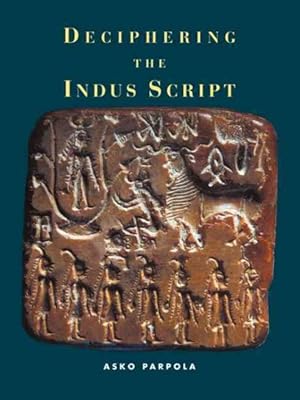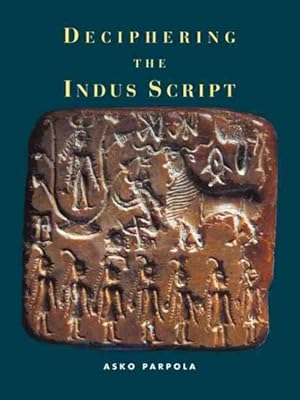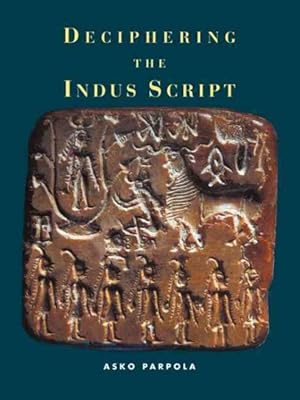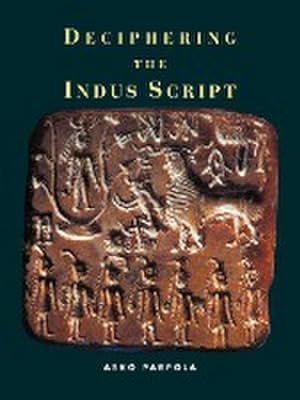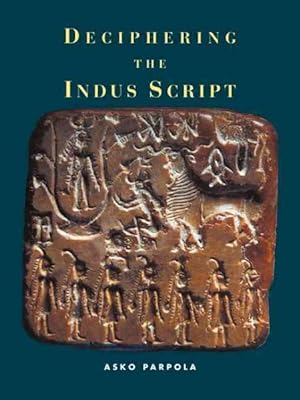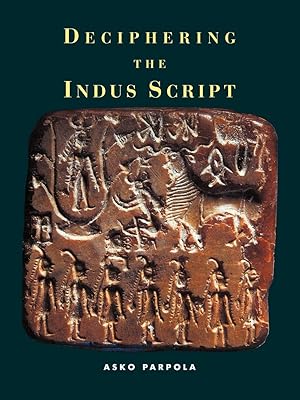Deciphering Indus Script by Parpola Asko (28 results)
FeedbackSearch filters
Product Type
- All Product Types
- Books (28)
- Magazines & Periodicals (No further results match this refinement)
- Comics (No further results match this refinement)
- Sheet Music (No further results match this refinement)
- Art, Prints & Posters (No further results match this refinement)
- Photographs (No further results match this refinement)
- Maps (No further results match this refinement)
- Manuscripts & Paper Collectibles (No further results match this refinement)
Condition Learn more
Binding
Collectible Attributes
- First Edition (1)
- Signed (No further results match this refinement)
- Dust Jacket (2)
- Seller-Supplied Images (8)
- Not Print on Demand (26)
Language (2)
Free Shipping
Seller Location
Seller Rating
-
DECIPHERING THE INDUS SCRIPT
Published by Cambridge University Press, 2009
ISBN 10: 0521795664 ISBN 13: 9780521795661
Language: English
Seller: Speedyhen, London, United Kingdom
Condition: NEW.
-
Deciphering the Indus Script
Published by Cambridge University Press, 2009
ISBN 10: 0521795664 ISBN 13: 9780521795661
Language: English
Seller: GreatBookPricesUK, Woodford Green, United Kingdom
£ 50.03
Convert currencyFree shipping within United KingdomQuantity: Over 20 available
Add to basketCondition: New.
-
Deciphering the Indus Script
Published by Cambridge University Press -, 2009
ISBN 10: 0521795664 ISBN 13: 9780521795661
Language: English
Seller: Chiron Media, Wallingford, United Kingdom
Condition: New.
-
Deciphering the Indus Script
Published by Cambridge University Press, 2009
ISBN 10: 0521795664 ISBN 13: 9780521795661
Language: English
Seller: Ria Christie Collections, Uxbridge, United Kingdom
£ 50.14
Convert currencyFree shipping within United KingdomQuantity: Over 20 available
Add to basketCondition: New. In.
-
Deciphering the Indus Script
Published by Cambridge University Press 2009-08-28, 2009
ISBN 10: 0521795664 ISBN 13: 9780521795661
Language: English
Seller: Chiron Media, Wallingford, United Kingdom
Paperback. Condition: New.
-
Deciphering the Indus Script
Published by Cambridge University Press, 2009
ISBN 10: 0521795664 ISBN 13: 9780521795661
Language: English
Seller: ThriftBooks-Atlanta, AUSTELL, GA, U.S.A.
£ 42.22
Convert currency£ 13.18 shipping from U.S.A. to United KingdomQuantity: 1 available
Add to basketPaperback. Condition: Good. No Jacket. Pages can have notes/highlighting. Spine may show signs of wear. ~ ThriftBooks: Read More, Spend Less 1.97.
-
Deciphering the Indus Script (Paperback)
Published by Cambridge University Press, Cambridge, 2009
ISBN 10: 0521795664 ISBN 13: 9780521795661
Language: English
Seller: CitiRetail, Stevenage, United Kingdom
Paperback. Condition: new. Paperback. Of the writing systems of the ancient world which still await deciphering, the Indus script is the most important. It developed in the Indus or Harappan Civilization, which flourished c. 2500-1900 BC in and around modern Pakistan, collapsing before the earliest historical records of South Asia were composed. Nearly 4,000 samples of the writing survive, mainly on stamp seals and amulets, but no translations. Professor Parpola is the chief editor of the Corpus of Indus Seals and Inscriptions. His ideas about the script, the linguistic affinity of the Harappan language, and the nature of the Indus religion are informed by a remarkable command of Aryan, Dravidian, and Mesopotamian sources, archaeological materials, and linguistic methodology. He outlines what is known about the Harappan culture and its script, presents a decipherment of a small number of interlocking Indus signs, and proposes a method which will permit further progress in decipherment. His fascinating study confirms that the Indus script was logo-syllabic, and that the Indus language belonged to the Dravidian family.He also argues that Indian astronomy was started by the Harappans, and that the Indus religion was genetically related to those of the ancient Near East and Hindu India. Professor Parpola outlines what is known about the Harappan culture and its script, deciphers a small number of interlocking Indus signs, and proposes a method which will permit further progress in decipherment. Shipping may be from our UK warehouse or from our Australian or US warehouses, depending on stock availability.
-
Deciphering the Indus Script
Published by Cambridge University Press, 2009
ISBN 10: 0521795664 ISBN 13: 9780521795661
Language: English
Seller: GreatBookPricesUK, Woodford Green, United Kingdom
£ 56.82
Convert currencyFree shipping within United KingdomQuantity: Over 20 available
Add to basketCondition: As New. Unread book in perfect condition.
-
Deciphering the Indus Script
Published by Cambridge University Press, 2009
ISBN 10: 0521795664 ISBN 13: 9780521795661
Language: English
Seller: Kennys Bookshop and Art Galleries Ltd., Galway, GY, Ireland
£ 60.09
Convert currency£ 2.59 shipping from Ireland to United KingdomQuantity: 1 available
Add to basketCondition: New. This fascinating study confirms that the Indus script was logo-syllabic and that the Indus language belonged to the Dravidian family. Num Pages: 400 pages, 135 line figures 141 tones 32 maps 8 tables. BIC Classification: 1F; CFL. Category: (P) Professional & Vocational; (U) Tertiary Education (US: College). Dimension: 271 x 201 x 23. Weight in Grams: 950. . 2009. Reissue. Paperback. . . . .
-
Deciphering the Indus Script
Published by Cambridge University Press, 2009
ISBN 10: 0521795664 ISBN 13: 9780521795661
Language: English
Seller: Rarewaves.com UK, London, United Kingdom
£ 65.40
Convert currencyFree shipping within United KingdomQuantity: Over 20 available
Add to basketPaperback. Condition: New. Reissue.
-
Deciphering the Indus Script
Published by Cambridge University Press, 2009
ISBN 10: 0521795664 ISBN 13: 9780521795661
Language: English
Seller: GreatBookPrices, Columbia, MD, U.S.A.
£ 52.65
Convert currency£ 14.70 shipping from U.S.A. to United KingdomQuantity: Over 20 available
Add to basketCondition: New.
-
Deciphering the Indus Script
Published by Cambridge University Press, 2009
ISBN 10: 0521795664 ISBN 13: 9780521795661
Language: English
Seller: Best Price, Torrance, CA, U.S.A.
£ 47.85
Convert currency£ 22.04 shipping from U.S.A. to United KingdomQuantity: 1 available
Add to basketCondition: New. SUPER FAST SHIPPING.
-
Deciphering the Indus Script
Published by Cambridge University Press, 2009
ISBN 10: 0521795664 ISBN 13: 9780521795661
Language: English
Seller: AHA-BUCH GmbH, Einbeck, Germany
£ 60.79
Convert currency£ 12.10 shipping from Germany to United KingdomQuantity: 1 available
Add to basketTaschenbuch. Condition: Neu. Druck auf Anfrage Neuware - Printed after ordering - This fascinating study confirms that the Indus script was logo-syllabic and that the Indus language belonged to the Dravidian family.
-
Deciphering the Indus Script
Published by Cambridge University Press, 2009
ISBN 10: 0521795664 ISBN 13: 9780521795661
Language: English
Seller: Kennys Bookstore, Olney, MD, U.S.A.
£ 70.94
Convert currency£ 2.21 shipping from U.S.A. to United KingdomQuantity: 1 available
Add to basketCondition: New. This fascinating study confirms that the Indus script was logo-syllabic and that the Indus language belonged to the Dravidian family. Num Pages: 400 pages, 135 line figures 141 tones 32 maps 8 tables. BIC Classification: 1F; CFL. Category: (P) Professional & Vocational; (U) Tertiary Education (US: College). Dimension: 271 x 201 x 23. Weight in Grams: 950. . 2009. Reissue. Paperback. . . . . Books ship from the US and Ireland.
-
Deciphering the Indus Script
Published by Cambridge University Press, 2009
ISBN 10: 0521795664 ISBN 13: 9780521795661
Language: English
Seller: GreatBookPrices, Columbia, MD, U.S.A.
£ 58.22
Convert currency£ 14.70 shipping from U.S.A. to United KingdomQuantity: Over 20 available
Add to basketCondition: As New. Unread book in perfect condition.
-
Deciphering the Indus Script
Published by Cambridge University Press, 2009
ISBN 10: 0521795664 ISBN 13: 9780521795661
Language: English
Seller: moluna, Greven, Germany
£ 57.73
Convert currency£ 21.61 shipping from Germany to United KingdomQuantity: 1 available
Add to basketCondition: New. The Indus script developed in the Indus or Harappan Civilization, which flourished around 2500-1900 BC in what is now modern Pakistan. In this fascinating study, Professor Parpola outlines what is known about the Harappan culture and its script and proposes.
-
Deciphering the Indus Script
Published by Cambridge University Press, 2009
ISBN 10: 0521795664 ISBN 13: 9780521795661
Language: English
Seller: Recycle Bookstore, San Jose, CA, U.S.A.
£ 32.56
Convert currency£ 48.52 shipping from U.S.A. to United KingdomQuantity: 1 available
Add to basketPaperback. Condition: Very Good. book has light shelf wear, slight crease to front cover, otherwise in solid clean shape.
-
Deciphering the Indus Script
Published by Cambridge University Press, GB, 2009
ISBN 10: 0521795664 ISBN 13: 9780521795661
Language: English
Seller: Rarewaves.com USA, London, LONDO, United Kingdom
£ 72.35
Convert currency£ 25 shipping within United KingdomQuantity: Over 20 available
Add to basketPaperback. Condition: New. Reissue. Of the writing systems of the ancient world which still await deciphering, the Indus script is the most important. It developed in the Indus or Harappan Civilization, which flourished c. 2500-1900 BC in and around modern Pakistan, collapsing before the earliest historical records of South Asia were composed. Nearly 4,000 samples of the writing survive, mainly on stamp seals and amulets, but no translations. Professor Parpola is the chief editor of the Corpus of Indus Seals and Inscriptions. His ideas about the script, the linguistic affinity of the Harappan language, and the nature of the Indus religion are informed by a remarkable command of Aryan, Dravidian, and Mesopotamian sources, archaeological materials, and linguistic methodology. His fascinating study confirms that the Indus script was logo-syllabic, and that the Indus language belonged to the Dravidian family.
-
Deciphering the Indus Script (Paperback)
Published by Cambridge University Press, Cambridge, 2009
ISBN 10: 0521795664 ISBN 13: 9780521795661
Language: English
Seller: AussieBookSeller, Truganina, VIC, Australia
£ 75.20
Convert currency£ 27.20 shipping from Australia to United KingdomQuantity: 1 available
Add to basketPaperback. Condition: new. Paperback. Of the writing systems of the ancient world which still await deciphering, the Indus script is the most important. It developed in the Indus or Harappan Civilization, which flourished c. 2500-1900 BC in and around modern Pakistan, collapsing before the earliest historical records of South Asia were composed. Nearly 4,000 samples of the writing survive, mainly on stamp seals and amulets, but no translations. Professor Parpola is the chief editor of the Corpus of Indus Seals and Inscriptions. His ideas about the script, the linguistic affinity of the Harappan language, and the nature of the Indus religion are informed by a remarkable command of Aryan, Dravidian, and Mesopotamian sources, archaeological materials, and linguistic methodology. He outlines what is known about the Harappan culture and its script, presents a decipherment of a small number of interlocking Indus signs, and proposes a method which will permit further progress in decipherment. His fascinating study confirms that the Indus script was logo-syllabic, and that the Indus language belonged to the Dravidian family.He also argues that Indian astronomy was started by the Harappans, and that the Indus religion was genetically related to those of the ancient Near East and Hindu India. Professor Parpola outlines what is known about the Harappan culture and its script, deciphers a small number of interlocking Indus signs, and proposes a method which will permit further progress in decipherment. Shipping may be from our Sydney, NSW warehouse or from our UK or US warehouse, depending on stock availability.
-
Deciphering the Indus Script (Paperback)
Published by Cambridge University Press, Cambridge, 2009
ISBN 10: 0521795664 ISBN 13: 9780521795661
Language: English
Seller: Grand Eagle Retail, Mason, OH, U.S.A.
£ 63.93
Convert currency£ 36.76 shipping from U.S.A. to United KingdomQuantity: 1 available
Add to basketPaperback. Condition: new. Paperback. Of the writing systems of the ancient world which still await deciphering, the Indus script is the most important. It developed in the Indus or Harappan Civilization, which flourished c. 2500-1900 BC in and around modern Pakistan, collapsing before the earliest historical records of South Asia were composed. Nearly 4,000 samples of the writing survive, mainly on stamp seals and amulets, but no translations. Professor Parpola is the chief editor of the Corpus of Indus Seals and Inscriptions. His ideas about the script, the linguistic affinity of the Harappan language, and the nature of the Indus religion are informed by a remarkable command of Aryan, Dravidian, and Mesopotamian sources, archaeological materials, and linguistic methodology. He outlines what is known about the Harappan culture and its script, presents a decipherment of a small number of interlocking Indus signs, and proposes a method which will permit further progress in decipherment. His fascinating study confirms that the Indus script was logo-syllabic, and that the Indus language belonged to the Dravidian family.He also argues that Indian astronomy was started by the Harappans, and that the Indus religion was genetically related to those of the ancient Near East and Hindu India. Professor Parpola outlines what is known about the Harappan culture and its script, deciphers a small number of interlocking Indus signs, and proposes a method which will permit further progress in decipherment. Shipping may be from multiple locations in the US or from the UK, depending on stock availability.
-
Deciphering the Indus Script
Published by Cambridge University Press, 2009
ISBN 10: 0521795664 ISBN 13: 9780521795661
Language: English
Seller: Lucky's Textbooks, Dallas, TX, U.S.A.
£ 52.15
Convert currency£ 55.14 shipping from U.S.A. to United KingdomQuantity: Over 20 available
Add to basketCondition: New.
-
Deciphering the Indus Script
Published by Cambridge University Press, 2009
ISBN 10: 0521795664 ISBN 13: 9780521795661
Language: English
Seller: Mispah books, Redhill, SURRE, United Kingdom
Paperback. Condition: Like New. Like New. book.
-
Deciphering the Indus Script
Published by Cambridge University Press, 2009
ISBN 10: 0521795664 ISBN 13: 9780521795661
Language: English
Seller: HPB-Red, Dallas, TX, U.S.A.
£ 41.32
Convert currency£ 84.55 shipping from U.S.A. to United KingdomQuantity: 1 available
Add to basketpaperback. Condition: Acceptable. Connecting readers with great books since 1972. Used textbooks may not include companion materials such as access codes, etc. May have condition issues including wear and notes/highlighting. We ship orders daily and Customer Service is our top priority!
-
Deciphering the Indus Script
Published by Cambridge University Press, 2009
ISBN 10: 0521795664 ISBN 13: 9780521795661
Language: English
Seller: BennettBooksLtd, San Diego, NV, U.S.A.
£ 102.47
Convert currency£ 32.35 shipping from U.S.A. to United KingdomQuantity: 1 available
Add to basketpaperback. Condition: New. In shrink wrap. Looks like an interesting title!
-
DECIPHERING THE INDUS SCRIPT.
Published by CUP, 1994
Seller: Francis Edwards ABA ILAB, Hay on Wye, United Kingdom
First Edition
1st Ed. 4to. xxii + 374pp. Vignette title page, numerous ills., photos., drawings, maps etc. Ownership inscription, good in lightly rubbed d/w. Additional postage may be necessary US$66.
-
Deciphering the Indus Script.
Published by Cambridge (Cambridge University Press), 1994
Seller: Ars Libri, Ltd. (ABAA), Charlestown, MA, U.S.A.
£ 75.72
Convert currency£ 33.08 shipping from U.S.A. to United KingdomQuantity: 1 available
Add to basketxxii, 374pp. Prof. illus. Lrg. 4to. Cloth. D.j.
-
Deciphering the Indus Script
Published by Cambridge University Press, 2009
ISBN 10: 0521795664 ISBN 13: 9780521795661
Language: English
Seller: THE SAINT BOOKSTORE, Southport, United Kingdom
£ 53.62
Convert currencyFree shipping within United KingdomQuantity: Over 20 available
Add to basketPaperback / softback. Condition: New. This item is printed on demand. New copy - Usually dispatched within 5-9 working days 970.
-
Deciphering The Indus Script
Seller: Revaluation Books, Exeter, United Kingdom
Paperback. Condition: Brand New. 1st edition. 400 pages. 10.75x8.00x0.75 inches. In Stock. This item is printed on demand.



